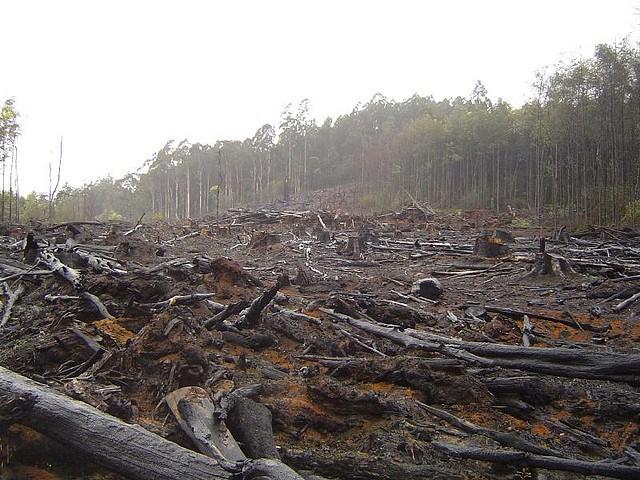
By Jeff Hayward
Forests are an indispensable piece of the climate puzzle, which is why they’re prominent in the U.N.’s new Sustainable Development Goals, and why they will also loom large at the COP21 Paris climate talks. The land sector -- agriculture, forestry and other land use -- is the second-largest emitter of greenhouse gases after energy. It accounts for almost a quarter of global emissions, including about 10 to 11 percent from deforestation, and the rest from agriculture, itself the main driver of deforestation.
Business is instrumental in transforming land use practices to stop deforestation. Sustainable sourcing of soft commodities grown on the land discourages converting forests to cropland and encourages sustainable management of forests.
Business had a hand in framing the SDGs, which include halting deforestation, conserving, restoring and replanting forests, and implementing sustainable management of all types of forests by 2020. Business should have a greater role in implementing them, as highlighted in a recent UN forum.
Business is also focused like never before on the U.N. climate process. CEOs of 43 of the world’s largest companies, calling themselves the B Team, are urging world leaders to commit to net-zero emissions by 2050 instead of 2100. Thousands of business leaders will gather in Paris in December to make the business case for bold climate action, to seek clarity on the scope of a climate agreement.
But meanwhile, businesses aren’t waiting for an agreement. They’re already setting and pursuing their own goals for stopping deforestation.
Many major companies have announced individual “deforestation-free” pledges. Fifty-two companies and counting joined governments in signing the New York Declaration on Forests and pledging to halve natural forest loss by 2020 and halt it by 2030. Through the Consumer Goods Forum, the CDP/We Mean Business Coalition, and the public-private Tropical Forest Alliance 2020, hundreds of major companies have committed to eliminating commodity-driven deforestation from their supply chains by 2020, including companies that account for 90 percent of the global trade in palm oil.
What matters most is turning those declarations into effective action. Protecting forests is a multi-layered proposition touching on many interlocking issues -- forest community and worker rights, care for non-forest ecosystems, water resources, etc. So making supply chains sustainable with respect to forests requires active sustainable management on many fronts.
For suppliers of agricultural commodities, that can include a range of practices from agroforestry, planting trees and maintaining forest buffer zones to reducing pesticide use, conserving water and soil and protecting wildlife. The coffee company Nespresso implements those practices on supplier farms, and is piloting a program to boost coffee farmers’ climate resilience through agroforestry.
“Since 2003, as part of our AAA Sustainable Quality Program together with the Rainforest Alliance, we have been committed to preserving biodiversity and reducing deforestation in coffee producing countries,” said Jérôme Perez, head of sustainability at Nestlé Nespresso. “Reforestation has also always been an important part of the program. We encourage farmers to preserve and plant shade trees in their farms, which enhances the quality, sustainability and productivity of their coffee, benefits the farmers and increases landscape resilience to climate change.”
For companies that source wood and pulp, a “deforestation-free” supply chain can’t mean that no trees were cut. But it can mean a company’s sourcing practices are sustainable and help reduce emissions if supplier forests are sustainably managed. Domtar, the leading North American pulp and paper company, is working to source all its fiber from Forest Stewardship Council certified sources.
"We welcome all sustainability efforts, and we believe anti-deforestation pledges are a good first step, but more comprehensive action is required,” said Paige Goff, vice president of sustainability and communications for Domtar. “We’re focused on achieving sustainable forest management throughout our supply chain. Third-party certification is a critical part of that process because it looks not just at the quantity of trees, but the quality our forests.”
Avery Dennison, a global leader in labeling and packaging materials, sources sustainably produced paper, uses its scale and buying power to help move the entire industry toward responsible sourcing. It collaborates with Domtar, the Rainforest Alliance, Staples and Columbia Forest Products on the Southeast Sustainable Forestry Project to help spread sustainable management among family-owned forests in the Southeastern U.S. And it pursues a wide range of internal sustainability goals, including developing a 100 percent sustainable certified sustainable paper supply, and steeply cutting its emissions.
"Reducing greenhouse gas emissions while still growing as a company is one of the defining business challenges of the 21st century, and we're proud to be addressing that challenge head-on, starting with our new 2025 goal to achieve absolute reductions of no less than three percent year-over-year,” said Dean Scarborough, Avery Dennison’s chairman and CEO, who will travel to Paris this December to discuss climate change with other business leaders at COP21. “The talks at COP21 have the potential to be a historic turning point and dramatically raise expectations for companies everywhere to reduce emissions."
Whatever international goals or agreements are struck on forests, they will be only as good as their implementation. It will take different actors on many levels, including national and local governments, and civil society, to make them a reality. But business has a special role. Its self-starting leadership will be a key factor in stopping deforestation, making forest supply chains sustainable, and cutting GHG emissions from the land sector.
Image credit: Flickr/crustmania
Jeff Hayward is the director of the Rainforest Alliance‘s climate program.
TriplePundit has published articles from over 1000 contributors. If you'd like to be a guest author, please get in touch!














